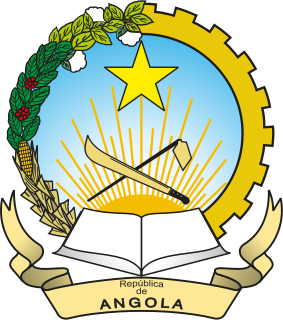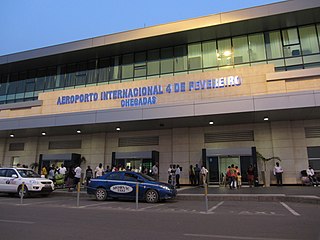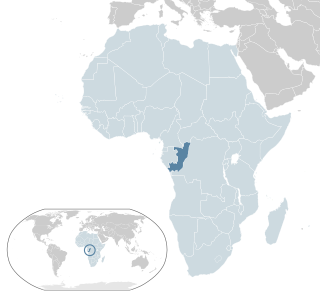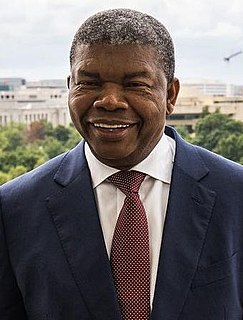| |||||
| Centuries: | |||||
|---|---|---|---|---|---|
| Decades: | |||||
| See also: | List of years in Angola | ||||
This article lists events from the year 2017 in Angola .
| |||||
| Centuries: | |||||
|---|---|---|---|---|---|
| Decades: | |||||
| See also: | List of years in Angola | ||||
This article lists events from the year 2017 in Angola .

Angola, officially the Republic of Angola, is a country located on the west coast of Southern Africa. It is the second-largest Lusophone (Portuguese-speaking) country in both total area and population, and is the seventh-largest country in Africa. It is bordered by Namibia to the south, the Democratic Republic of the Congo to the north, Zambia to the east, and the Atlantic Ocean to the west. Angola has an exclave province, the province of Cabinda, that borders the Republic of the Congo and the Democratic Republic of the Congo. The capital and most populous city is Luanda.

The current political regime in Angola is presidentialism, in which the President of the Republic is also head of state and government; it is advised by a Council of Ministers, which together with the President form the national executive power. Legislative power rests with the 220 parliamentarians elected to the National Assembly. The President of the Republic, together with the parliament, appoints the majority of the members of the two highest bodies of the judiciary, that is, the Constitutional Court and the Supreme Court. The judiciary is still made up of the Court of Auditors and the Supreme Military Court.

Angola is a country in southwestern Africa. The country's name derives from the Kimbundu word for king. Angola was first settled by San hunter-gatherer societies before the northern domains came under the rule of Bantu states such as Kongo and Ndongo. In the 15th century, Portuguese colonists began trading, and a settlement was established at Luanda during the 16th century. Portugal annexed territories in the region which were ruled as a colony from 1655, and Angola was incorporated as an overseas province of Portugal in 1951. After the Angolan War of Independence, which ended in 1974 with an army mutiny and leftist coup in Lisbon, Angola achieved independence in 1975 through the Alvor Agreement. After independence, Angola entered a long period of civil war that lasted until 2007

The National Union for the Total Independence of Angola is the second-largest political party in Angola. Founded in 1966, UNITA fought alongside the Popular Movement for the Liberation of Angola (MPLA) in the Angolan War for Independence (1961–1975) and then against the MPLA in the ensuing civil war (1975–2002). The war was one of the most prominent Cold War proxy wars, with UNITA receiving military aid initially from People's Republic of China from 1966 until October 1975 and later from the United States and apartheid South Africa while the MPLA received support from the Soviet Union and its allies, especially Cuba.

The president of Angola is both head of state and head of government in Angola. According to the constitution adopted in 2010, the post of prime minister is abolished; executive authority belongs to the president who has also a degree of legislative power, as he can govern by decree.

José Eduardo dos Santos was the president of Angola from 1979 to 2017. As president, dos Santos was also the commander-in-chief of the Angolan Armed Forces (FAA) and president of the People's Movement for the Liberation of Angola (MPLA), the party that has ruled Angola since it won independence in 1975. He was the second-longest-serving president in Africa, surpassed only by Teodoro Obiang Nguema Mbasogo of Equatorial Guinea.

Quatro de Fevereiro International Airport, is the main international airport of Angola. It is located in the southern part of the capital Luanda, situated in the Luanda Province. Quatro de Fevereiro means 4th of February, which is an important national holiday in Angola, marking the start of the armed struggle against the Portuguese colonial regime on 4 February 1961. In 2009, about 1.8 million passengers were counted.

The Second Republic of the Congo Civil War was the second of two ethnopolitical civil conflicts in the Republic of the Congo, beginning on 5 June 1997 and continuing until 29 December 1999. The war served as the continuation of the civil war of 1993–1994 and involved militias representing three political candidates. The conflict ended following the intervention of the Angolan military, which reinstated former president Denis Sassou Nguesso to power.

Legislative elections were held in Angola on 5 and 6 September 2008, as announced by President José Eduardo dos Santos on 27 December 2007. They were the first since the 1992 general elections, which had led to the outbreak of the second phase of the Angolan Civil War, which continued until 2002.
The Agreement among the People's Republic of Angola, the Republic of Cuba, and the Republic of South Africa granted independence to Namibia from South Africa and ended the direct involvement of foreign troops in the Angolan Civil War. The accords were signed on 22 December 1988 at the United Nations Headquarters in New York City by the Foreign Ministers of People's Republic of Angola, Republic of Cuba and Republic of South Africa.

António Paulo Kassoma is an Angolan politician. He was named Prime Minister of Angola in September 2008 and remained in office until the new constitution replaced this function in February 2010. Kassoma then served as President of the National Assembly of Angola from 2010 to 2012. On August 27, 2016 Kassoma was named Party Secretary of the People's Movement for the Liberation of Angola.

The vice president of Angola is the second highest political position in Angola; it is the deputy to the head of state, and is appointed by the president. The position was established by the constitution of 2010.

General elections were held in Angola on 31 August 2012 to elect the President and National Assembly. During campaigning, the opposition UNITA and its offshoot CASA-CE accused and criticised the government of corruption and called for greater transparency; this also led to protests and arrests the day before the election. These were the first elections after the new 2010 constitution was instituted.

Angola–India relations refers to the international relations that exist between Angola and India.

Domant Futebol Clube de Bula Atumba is an Angolan sports club from the village of Bula Atumba, in the northern province of Bengo. The team currently plays in the Gira Angola and is based in the province's capital city of Caxito.

General elections were held in Angola on 23 August 2017 to elect the President and National Assembly, although voting was delayed until 26 August at 15 polling stations due to bad weather on election day. The top candidate of the winning party is elected president. The ruling party MPLA headed by João Lourenço was widely expected to win. Preliminary results show that MPLA won with a clear margin. The final results were released on 6 September 2017.

João Manuel Gonçalves Lourenço is an Angolan politician, who has served as the president of Angola since 26 September 2017. Previously, he was Minister of Defence from 2014 to 2017. In September 2018, he became the Chairman of the People's Movement for the Liberation of Angola (MPLA), the ruling party. He was the party's Secretary-General from 1998 to 2003.

Bornito de Sousa Baltazar Diogo is an Angolan politician who was the vice president of Angola, from 2017 to 2022. He was the vice presidential candidate for the MPLA in the 2017 Angolan general election, running alongside João Lourenço and a member of the Constituent Assembly since 2010. He was officially sworn in as vice president on 26 September 2017.

General elections were held in Angola on 24 August 2022 to elect the President and National Assembly. Incumbent president João Lourenço was eligible for one more term. The MPLA was re-elected with a reduced majority, winning 124 seats with 51% of the vote. The main opposition party, UNITA won 90 seats with 44% of the vote. The Social Renewal Party (PRS), the National Liberation Front of Angola (FNLA) and the Humanist Party of Angola (PHA) each won two seats. The elections were the closest in Angolan history between the MPLA and UNITA.
![]() Media related to 2017 in Angola at Wikimedia Commons
Media related to 2017 in Angola at Wikimedia Commons